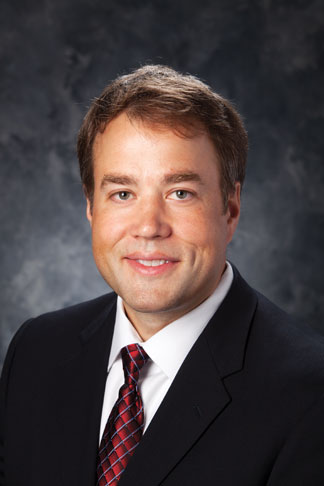Athens, Ga. – A University of Georgia professor is making strides in bringing the science of organizational management to other sciences that rely on computing, with the goal of making data-intensive projects, such as monitoring hurricanes and modeling treatments for disease outbreaks, more effective.
Nicholas Berente, assistant professor of management information systems in the Terry College of Business, has received a $500,000 grant from the National Science Foundation’s Office of Cyberinfrastructure. The award builds on Berente’s previous NSF-funded study on how to successfully design and manage large-scale science and engineering centers.
Through a series of workshops, his project aims to foster a community of experts from organizational management and research centers. Berente hopes their shared expertise will lead to better management of large collaborative centers that rely on computational resources.
“These collaborative centers represent organizations of the future,” said Berente. “They are dealing with some of society’s most intractable problems, including climate change, disasters and global health. To address these problems, such research centers are bringing together cross-disciplinary teams of specialists that collaborate remotely and contribute specialized knowledge to a number of different projects simultaneously.”
“These scientific centers are bringing together domain scientists and cyberinfrastructure to enable new kinds of research,” said Susan Winter, a program director at NSF’s Office of Cyberinfrastructure. “Instead of just watching hurricanes, we can model them and predict their effects. Instead of just tracking flu outbreaks after they have occurred, we can explore potential steps to allow early identification and control.”
“The big question is: how do you manage this sort of complex collaboration?” said Berente.
Berente’s workshops-which focus on virtual organizations, scientific software and cyberinfrastructure-will address the concerns that come with running large-scale science operations.
As organizations have evolved-moving online, with researchers in disparate parts of the globe, unconstrained by barriers of time and space-scientists have struggled to keep up and use those changes to their advantage, according to Berente.
“What we’re looking at is being able to create and maintain a connected set of cyberinfrastructure resources,” said Winter. “We want to know how to do more with what we have and how to make it easier for the scientists to use the technology that’s available so that they can do what they need to do more quickly and effectively.”
Through his six workshops held at UGA, the University of Texas at Austin and the University of Michigan, Berente hopes to foster a common language between the people who run collaborative research centers and the people who can help them do so more effectively.
“It’s all about innovation,” said Berente. “There’s a really strong research tradition in organizational scholarship about innovation, about how to foster innovation and the different management tactics to bring about innovation. We’re trying to figure out what applies to collaborative cyberinfrastructure research centers, and then what might be actionable in helping manage them.”
For more information on the management information system department in the UGA Terry College of Business, see www.terry.uga.edu/mis.
##
Note to editors: An image of Berente is available for download at http://multimedia.uga.edu/media/images/Berente_Nicholas.jpg.
